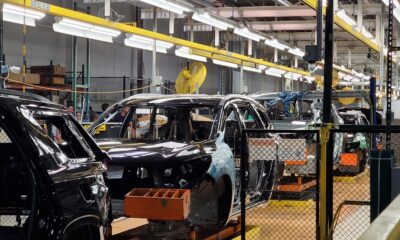British auto and aerospace manufacturing giant Rolls-Royce is reportedly planning to expand production in the United States to mitigate the potential impact of tariffs under President Donald Trump’s administration.
According to a report from the Daily Telegraph, the U.K.-based company is drafting contingency plans to counter potential trade restrictions. While Trump has already imposed tariffs on imports from Canada, Mexico, and China, he has hinted at possible tariffs on the European Union and other trading partners in the near future.
Trump Signals Tariff Expansion on European Goods
Trump has been vocal about his longstanding criticism of the European Union’s trade policies. In January, he reaffirmed his stance on tariffs when asked about his plans:
“Am I going to impose tariffs on the European Union? Do you want the truthful answer or should I give you a political answer? Absolutely.”
He further criticized the EU’s trade policies, stating that the bloc has “treated the U.S. terribly” when it comes to trade agreements.
In December, Trump urged European nations to address trade imbalances by increasing their purchases of American energy products. In a warning on Truth Social, Trump posted:
“Otherwise, it is TARIFFS all the way!!!”
Rolls-Royce Plans U.S. Expansion to Avoid Trade Disruptions
In response to Trump’s protectionist trade policies, Rolls-Royce is taking proactive steps to shield itself from potentially costly tariffs. The company is reportedly considering expanding its U.S. manufacturing footprint, including:
- Hiring more American workers
- Opening additional production plants in the United States
- Shifting operations from Canada, Mexico, and China to U.S. facilities
Currently, Rolls-Royce employs 6,000 workers across 11 sites in the United States. However, with the looming threat of expanded tariffs, the company may accelerate efforts to increase domestic production and reduce reliance on international supply chains.
Protectionist Trade Policies Fuel Industry Uncertainty
During an earnings call earlier this month, Rolls-Royce executives warned investors about growing protectionism in global trade. The company acknowledged that tariffs could raise costs and confirmed that plans are in place to minimize the financial impact.
“Market exposures are being monitored, and we are adapting supply chain strategies to ensure resilience amid potential protectionist measures and evolving trade dynamics.”
A source familiar with Rolls-Royce’s strategy told the Daily Telegraph that the company is “tipping the balance towards the U.S.” in anticipation of tariffs.
“If you are making something in countries like China, then you’ll be looking at whether you can do it in the U.S. instead,” the source said.
Trump’s ‘Liberation Day’ and Expected Tariff Announcement
President Trump has suggested that April 2 will mark a key turning point in his trade policy, referring to it as “liberation day.” On this date, he is expected to expand tariffs beyond the current three targeted nations in an effort to rebalance global trade.
“We’re getting back to some of the wealth that very, very foolish presidents gave away because they had no clue what they were doing,” Trump stated last week.
With the April 2 deadline approaching, global manufacturers—especially those operating in Europe, Canada, Mexico, and China—are racing to reassess their supply chains and adapt to shifting trade policies.
Rolls-Royce May Restructure European Operations
While Rolls-Royce is focusing on U.S. expansion, reports suggest that the company may also scale back operations in the U.K. and European Union to avoid tariffs.
In a warning to shareholders, Rolls-Royce stated:
“Tariffs against key trade partners could lead to increased costs and consequently realign the global supply chain.”
The company is closely monitoring potential disruptions and is actively working to fortify its supply chain strategy against future trade uncertainties.
The Future of Rolls-Royce and Global Trade
As the Trump administration pushes for trade realignment, companies like Rolls-Royce must adapt swiftly to avoid costly tariffs and supply chain bottlenecks. The firm’s shift toward U.S.-based manufacturing signals a broader trend among multinational corporations seeking stability in the face of shifting global trade policies.
Whether Trump follows through on expanded tariffs remains to be seen, but one thing is clear: major corporations are not waiting for the official announcement to take action.
